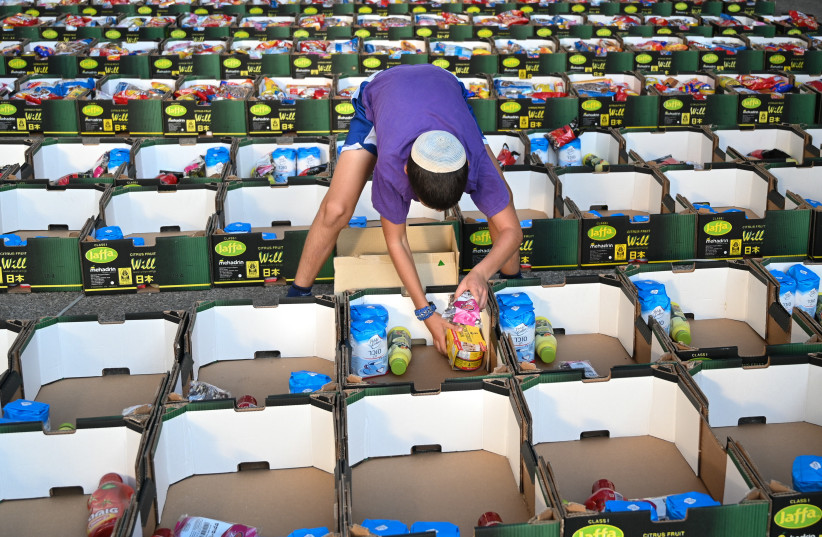Nicky Cregor was honored on The Jewish News-Jewish Agency Aliyah 100 list as one of 100 Jews to make aliyah from the United Kingdom who have had a powerful impact on the State of Israel. Cregor ranked eighth on the list, compiled in 2017 in commemoration of the centenary of the Balfour Declaration.
Cregor made aliyah alone at 19 and went on to receive a degree in social work from the University of Haifa, followed by a master’s at the Hebrew University. Working her way up the professional ladder at the Jerusalem Municipality, she recently assumed a new administrative position after 10 years as director of volunteer services.
 Learn how to buy your home in Israel with confidence
Learn how to buy your home in Israel with confidenceThe Magazine recently sat down with Cregor in her municipal office.
What inspired you to make aliyah?
I am a proud graduate of the Reform Zionist Youth movement. My family belonged to a Reform congregation. From the age of 10, I went to Reform summer camps – first as a camper, and then as a junior counselor and a senior counselor. When I was 18, I fell in love with the idea and ideals of Zionism. I wanted my life to have meaning. My journey began at Kibbutz Yahel, a Reform kibbutz in southern Israel, where I remained as an adopted student for my first five years.
When you were director of volunteer services, did you do any volunteering yourself?
Absolutely. I am a very active volunteer in my synagogue, Kol HaNeshama, in the Jerusalem neighborhood of Baka. It was established in 1984, the same year as my aliyah. Kol HaNeshama is more than my synagogue. From the beginning, it has been my community and my family. As a connector, I link members with volunteer opportunities. For example, I connected a sports trainer with children at risk. I also chair the Social Action Committee of the Reform Movement in Israel.

It has been said that volunteering has a positive impact on the volunteers themselves. How so?
Volunteering is where it’s at if you want to feel stronger, better, and healthier. It’s a bridge for an immigrant to the Israeli world, where you meet people you would never meet otherwise. It allows you to improve your Hebrew. The more you volunteer, the stronger your bonds to others become. Volunteering makes individuals feel valued and needed.
What is known about the extent of volunteering since Oct. 7?
These are the results from a Hebrew University study written by Prof. Michal Almog-Bar, Ronit Bar, Ron Barkai, and Hila Marmus, published on November 2, 2023: Preliminary findings indicate that a substantial proportion, approximately 48.6% of the Israeli population, engaged in volunteering during this critical period.
There was participation across all age groups. Notably, in the younger age group (18-35), 46% actively engaged in volunteering, while the middle age group (35-55) recorded a 52% participation rate, and the older age group (55+) also contributed significantly with a 52% involvement rate. Remarkably, the rates of volunteerism were almost equal for both men and women, as well as for individuals with religious and secular affiliations.
The survey also revealed that a substantial majority of volunteers had not engaged in volunteering previously and chose to do so spontaneously during the war.
You started out 30 years ago as a social worker with the Jerusalem Municipality. What has kept you there?
I feel very passionate about being a social worker. I like to talk. I like to listen. I like to help people. And I like working in a team. When working at the Jerusalem Municipality, you are always working within a team. That is one of the reasons I have been so happy there. There are also opportunities for professional growth. I started out as a social worker in Mahaneh Yehuda, and I am now senior department head of Employment for Academics and Students. Many of my colleagues then are still my colleagues today, and we currently head different departments within the system. I feel it is a privilege to work in the municipality.
On the Aliyah 100 list, you are described as an expert negotiator, creating conditions among diverse organizations and communities. Can you give an example?
As a negotiator, I talk to both sides before a meeting, to make sure I know what they want. Then when they come to the table, everyone knows they have been heard. Over the years I have worked with over 400 NGOs [non-government organizations]. When I was the coordinator of services for the elderly, I led a series of protests to increase government budget allocations and championed the causes of IDF veterans and Holocaust survivors. I like being ‘out there.’ It is not very British, but it is who I am.
Any advice for a new immigrant who wants to follow in your footsteps up to an administrative position in a municipal office?
First, being passionate about what you do is a key to success. And second, master the Hebrew language. In a Hebrew-language environment, where communication is essential, doors are open to those who speak the language.
You have your family, friends, job, and volunteering at Kol HaNeshama. Do you have other interests?
I love board games. Two of my three children are religious, and we spend a lot of time on Shabbat playing board games. My parents used to say, ‘Only boring people are bored.’
What volunteer opportunities are available in Jerusalem for English speakers?
The list is never ending. There is a huge need for English-speaking volunteers in the schools. As a resource, I highly recommend the Jerusalem Municipality’s English website for the general section on volunteering and the special section for senior citizens. Nefesh B’Nefesh also lists different volunteer opportunities on its website. ■
- jerusalem.muni.il/en/newsandarticles/educationmessages/studentsvolunteering
- jerusalem.muni.il/en/residents/volunteering/seniorvolunteering/
- nbn.org.il/life-in-israel/education/higher-education/volunteer-programs
Nicky Cregor From London to Jerusalem, 1984
 Sign up for our newsletter to learn more
Sign up for our newsletter to learn more 